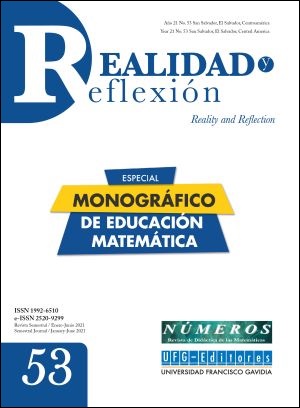La resolución de problemas en la formación inicial del profesorado de Primaria: una experiencia de aula
DOI:
https://doi.org/10.5377/ryr.v53i53.10896Palabras clave:
Formación Inicial de Profesores de Primaria, Planteamiento de Problemas, Resolución de Problemas, Educación MatemáticaResumen
En este artículo reflexionamos acerca del papel de la resolución de problemas en la formación inicial de profesores de Educación Primaria. Tras retomar algunas aportaciones relevantes en el ámbito de la resolución de problemas en la educación matemática, nos centramos en la doble vertiente de plantear y de resolver problemas, analizando la relevancia que esa doble componente tiene, tanto en la educación obligatoria, como en la formación inicial de profesores. El último epígrafe del artículo comienza con una contextualización de la formación en educación matemática de los futuros maestros de Primaria en la Universidad de Huelva, para cerrar detallando el desarrollo de una experiencia de aula que ejemplifica cómo trabajamos con los futuros maestros “aprender y aprender a enseñar a plantear y resolver problemas”.
Descargas
471
Descargas
Publicado
Cómo citar
Número
Sección
Licencia
© Universidad Francisco Gavidia (UFG)
Política de acceso abierto y derechos de autor
- El contenido y opiniones vertidas en cada contribución son responsabilidad de sus autores. Los autores ceden los derechos de edición y publicación, en versión impresa y digital, a la Universidad Francisco Gavidia.
- La revista Realidad y Reflexión es alojada en las plataformas institucionales de difusión, así como en bases de datos y otras páginas de divulgación científica.
- Las publicaciones de la Universidad Francisco Gavidia se acogen a la normativa salvadoreña de derechos de autor, contemplada en la Ley de Propiedad Intelectual https://wipolex-res.wipo.int/edocs/lexdocs/laws/es/sv/sv001es.pdf
- UFG Editores no realiza ningún cobro por postular, procesar, publicar o acceder a los aportes publicados; los miembros del Consejo Editorial y quienes conformen el Comité Científico en los número monográficos ejercen sus funciones con carácter Ad honorem.
- La revista Realidad y Reflexión opera bajo la modalidad de acceso abierto, a fin de agilizar la transferencia del conocimiento, disminuir la brecha de acceso a la información, incrementar la visibilidad, y, por lo tanto, la difusión de los aportes publicados.
- La revista declara su compromiso con el acceso abierto en la modalidad diamante, lo que significa que los lectores pueden acceder a todos los contenidos de manera gratuita y sin restricciones, y que los autores no deben asumir ningún costo de publicación o procesamiento de sus documentos.
- Las contribuciones pueden ser descargadas, utilizadas y distribuidas, atendiendo las condiciones de la licencia Creative Commons https://creativecommons.org/licenses/by-nc-sa/4.0/

